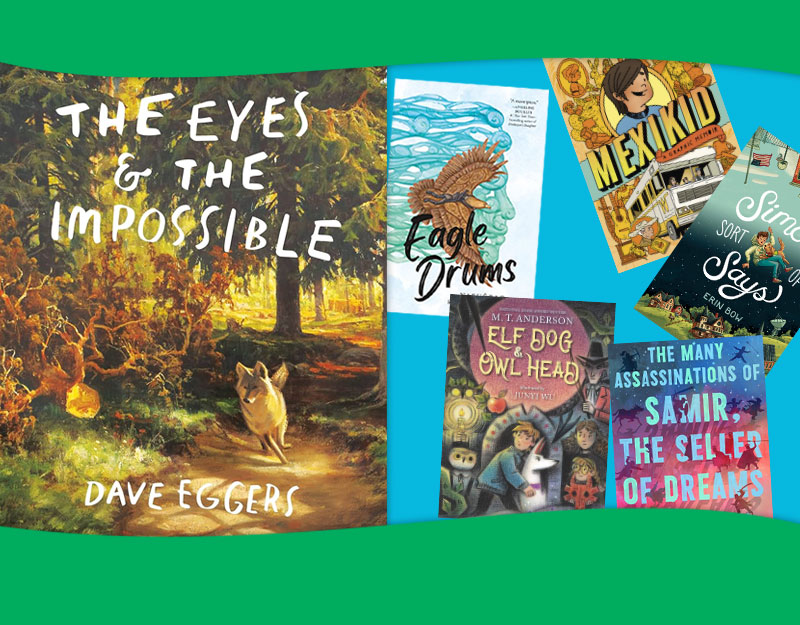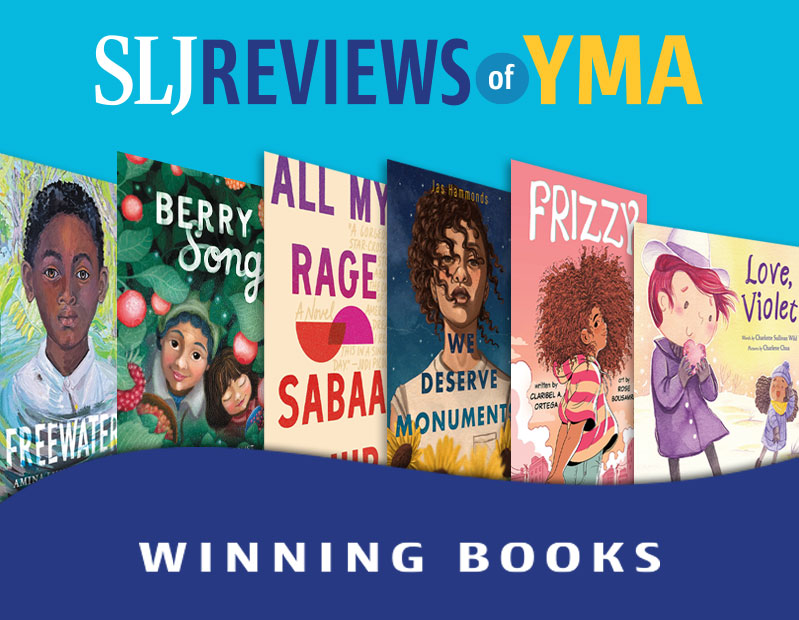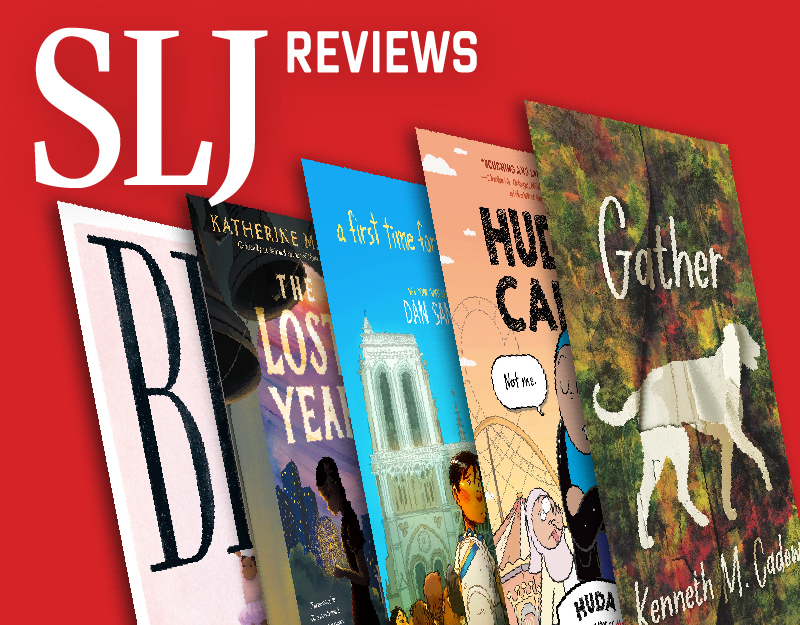My One Hundred Adventures
*Discussion This Sunday—Shortlist Here!*
While I attempt to compose myself over the Bloomberg article…Sharon and I will also be sharing some more thoughts on our shortlist titles as we head towards our weekend discussion. Please chime in!
Sharon called My One Hundred Adventures “Just Not My Thing,” and that is a common cry in comments that I’ve found on this one.
The first thing that I think of when I recall this book is the absurd humor and surrealism that crops up in otherwise serious moments—imitating life. The clotheshanger man and whale. Mrs. Spinnaker saving Jane and then getting in a huff when her dog is slighted. Mrs. Park choking on the taffy.
I also appreciated the way that reader only slowly realizes just how poor this family is. It is understated in the narrative, because it is accepted and understood by Jane, with both sense of humor and pride: “My mother has been out fishing from the pier on the lake all morning because last night we had chicken and rice for dinner without the chicken.” (p.53)
ADVERTISEMENT
ADVERTISEMENT
But the book clearly suffers in catching some readers’ attention, while it enthralls others. It is certainly lacking in plot–Wendy (a commenter here) says in her Goodreads comment that if this with its writing and Savvy with its plotting got together “they could have one awesome Newbery winner of a child.” I’m wondering if the same people that dislike it felt the same about Kira-Kira or Criss Cross?
Some readers just don’t need plot as much as they need interior development of the protagonist. In this, I find My One Hundred Adventures interestingly comparable to After Tupac and D Foster—though here the protagonist is much more on her own in her coming of age. Hers is both one of enchantment (with the world) and disillusionment (with adults). And her coming of age is also rooted in place. The summer she wanted—the one of her childhood—happens somewhere else:
“I look at the big pots of blueberries on the kitchen table and our pantry filling with another row of jam jars and I am sad. It is as if I am missing summer. It is as if I am missing my life. It is happening here without me.” p.142
At the end of the book, she’s headed off to Saskatchewan, and nothing will be the same:
“It is endless waves of land with nothing on it. It is bleak and barren and empty with nothing much to see.” p.256
But is comforted by her mother’s memories with that place:
“My mother’s face is alight with the memory and I realize that I don’t need to worry about her leaving this place. To her all places are this place.” p.255
Knowing this, turn back to the very first sentence, and it takes on a whole different level of meaning:
“All summers take me back to the sea.” p.1
This is a book that definitely changes on re-reading, and offers something for readers to grow with. To me, a book that lasts, that bears up and changes with multiple readers, is something distinguished.
Is this the most distinguished book of the year? I find here that Jane’s voice occasionally slips out of the believable—a little more so to me than in After Tupac and D Foster. But to readers for whom this is “just not your thing”… there is richness here if you’re willing to look at it differently.
Filed under: Uncategorized
About Nina Lindsay
Nina Lindsay is the Children's Services Coordinator at the Oakland Public Library, CA. She chaired the 2008 Newbery Committee, and served on the 2004 and 1998 committees. You can reach her at ninalindsay@gmail.com
ADVERTISEMENT
ADVERTISEMENT
SLJ Blog Network
One Star Review, Guess Who? (#202)
This Q&A is Going Exactly As Planned: A Talk with Tao Nyeu About Her Latest Book
Exclusive: Giant Magical Otters Invade New Hex Vet Graphic Novel | News
Parsing Religion in Public Schools
Take Five: LGBTQIA+ Middle Grade Novels
ADVERTISEMENT








Nina, the Bloomberg article is totally not worth getting upset about if you don’t want to. The research it’s based on was so flawed, and I haven’t noticed anyone paying much attention (not like with the Silvey article and similar).
Personally, even though I wasn’t crazy about this book, I LOVED Criss Cross. (I didn’t realize people criticized Kira-Kira for lack of plot, which seems odd to me.) The problem, for me, with My One Hundred Adventures is not that “nothing ever happens”–which is what people say about Criss Cross–but that there’s no clear arc or pathway to me. I kept wondering what exactly I was reading. In Criss Cross, the story is woven together so well, and everything worked. This book felt disjointed to me.
I recently made a reference to Criss Cross myself, when my sister and I were disagreeing (on Goodreads) about White Sands, Red Menace; I said there wasn’t a compelling plot in that book, but I’m still having trouble explaining why I wanted more in that and have no issue with Criss Cross. I think it comes down to more than whether books are plot-driven or not. Does it keep the reader wanting to read? (Subjective, of course.) Does the book feel like it’s forming a cohesive whole?
I did already decide to reread My One Hundred Adventures before Sunday, because I think I’ll get more from it once I’m not looking for “what’s going to happen?”. And I’m also keeping in mind that my feeling that this isn’t as good as Everything On a Waffle is irrelevant.
Testing… my comment about why I loved Criss Cross and not this seems to be lost in limbo; checking to see if I should just rewrite it.
I’m clicking on comments and nothing is displaying. I am only having that trouble with this one post.
Sorry! Mea culpa…I’d left the setting on “comments” as “pending” instead of “live.” A slip of the mouse.
I thought this was a better book than Waffle, Wendy. I found, as Nina points out, that the plot was more through internal movement. Jane goes looking for some kind of sign, the purple light against the sky and she finds all these mystic signs but what do they mean? What good do they do? In the end, the thing that really inspires wonder is the mother who doesn’t attack Mrs. Gourd – believe me if she’d done to my daughter what she did to Jane, I would want to – but instead takes her for a walk to show her the places to find food for her children, the blueberry bogs and clam beds and places where the wild orach grows. I found this book much more poignant than Waffle. But I’d agree it isn’t an easy book like Waffle.
My reactions to Horvath have varied with each book she writes, but My One Hundred Adventures was my favorite book of 2008. “Richness” – you said it! My copy was bristling with post-its by the end, marking instances of insight, humor, and sheer humanity. My review: evasbookaddiction.blogspot.com/2008/12/my-one-hundred-adventures-by-polly.html
Valerie, what makes you call Everything on a Waffle an “easy book”? (You said “I’d agree”, but since I didn’t say that, I’m not sure what you mean.)
As I mentioned above, it isn’t that I think nothing ever happens; just that the plot isn’t cohesive. I think all or most readers will agree that there are well-written phrases and insights that hit home here; what I’m interested to know is how this book works for you guys as a story.
Well, I meant easy in that you just zoom through it through a fairly obvious plot of girls parents disappear, girl thinks they will come back, what happens to her in meantime, parents return. But adventures is more sophisticated and complicated because you have to be a little more conscious of a cohesive internal development and that that is the plot. Jane wants to find out if there is some kind of intelligence in the universe, god or whatever and it takes her on a number of adventures where she thinks she knows what is going on and then she finds out she didnt all along and has to further develop to figure out how this fits into her idea of some kind of moral universe, whereas all along there is that mother of hers, to me the epitome of judgeless love. I heard a kid who read this ask why mrs gourd didn’t get her comeuppance and this segued into a whole discussion on justice and is it really just revenge and then the death penalty if you can believe it. And I thought, the book doesn’t just bring Jane to this place of more sophisticated questions, it brings the reader to it to and that a good book doesn’t have a plot that ends on the last page, it draws us into its questions and we come part of it. Whereas I think WAffle had an obvious and easy boy meet girl boy lose girl boy gets girl back plot that is easy to follow, if you substitute parents for boy. And when the book finishes, that’s it, you can leave it. So that can be satisfying but I think it can also make it the lesser book. In that sense I dont think Waffle was more cohesive. Just less sophisticated. I think the internal development and the questions that get asked, develop and do so in a very cohesive way. You may find this on the second read.
To me, this book is about expectations, the prism of perception, and the evolution of love. Jane Fielding wants to experience life more fully. This is a want that is very difficult to satisfy in a novel without becoming all existential and asking a lot of questions in the end.
I connect with this book because of the tension between the outrageous and the poetic. I can appreciate this kind of tension because, in life, I am trying to react, and teach my children to react, to the outrageous in a way that Jane’s mother would, without my intrusive ego getting in the way.
Wendy, I think the character IS the plot in this sense
I’m trying this again–my comment was cut short.
To me, this book is about expectations, the prism of perception, and the evolution of love. Jane Fielding wants to experience life more fully. This is a want that is very difficult to satisfy in a novel without becoming all existential and asking a lot of questions in the end.
I connect with this book because of the tension between the outrageous and the poetic. Jane’s mother is a model for us, to react to the outrageous without letting those intrusive egos get in the way.
Wendy, I think the character IS the plot in this sense; and the plot becomes a character in itself. The arc is there, in that struggle to be present, no matter where home is. In the end, poetry (love) wins.
I do understand the quibbles about plot structure. It’s certainly worth talking about, but ultimately I think if we’re discussing diversity in the Newbery, we should be talking as much about representation of different structures and styles as we do about the representation of ethnicities. In fact, I daresay that the diversity of the art itself is MORE important.
My own review is here:
lorivanhoesen.blogspot.com/2009/01/my-one-hundred-adventures-by-polly.html
Valerie, I think you’re selling Everything on a Waffle short–if it was really as simplistic as all that, I doubt they would have given it the Newbery Honor. And I’d say that one of its strengths is how it takes a fairly familiar setup and subverts it.
But you do bring up a point that I think is apropos to the current year’s books (Sharon may have mentioned this before)–yes, I agree that My One Hundred Adventures is more sophisticated and for a slightly older audience than Everything on a Waffle–it’s probably more sophisticated than many of the eligible books. I think it’s easy for many of us (including myself) to think the more sophisticated, the better–because more sophisticated books are deeper treatments of the plot and characters. And I think distinguished books have plenty of depth, even if they’re humorous. So how do we judge a book for younger readers against one for slightly older readers? How do we let go of “that was good, but this is more complex and meaningful”?
Is this book even eligible? I believe Polly Horvath is Canadian. (The blurb at the end of My One Hundred Adventures mentioned where in Canada she lives.)
Polly Horvath lives in Canada, but is an American citizen, so she is eligible.